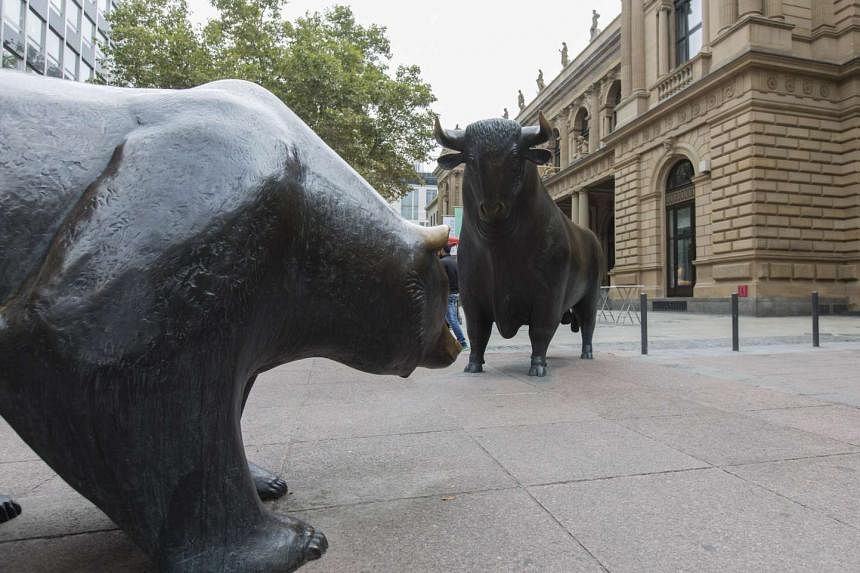It has been a tough year for investors all over the world with key asset classes from stocks to commodities taking a battering in the third quarter. Portfolios here have been hurt by China's slowdown and a stagnant global economy.
The MSCI All-Country World Index, which tracks stock market performance across 23 developed markets and 23 emerging ones, fell about 10 per cent in the three months to Sept 30 - its biggest quarterly loss since 2011. Currencies and commodities were mostly hammered as well, while bonds posted marginal gains.
China is at the centre of the drama, where the slowing economy has continued to unnerve investors. Shanghai's composite index tumbled a whopping 29 per cent in the third quarter - the biggest fall of any market - while the yuan weakened 2.4 per cent after an unexpected devaluation in August.

"Concerns over the global impact of China's economic slowdown dominated financial markets in the third quarter, where markets suffered their worst risk-off moment since 2011," said Mr Wong Hur Ming, South-east Asia head of wholesale distribution at Henderson Global Investors.
Mr Kelvin Tay, regional chief investment officer for Southern Asia-Pacific at UBS Chief Investment Office Wealth Management, added that speculation over an impending rate hike in the United States this year has also "caused nervousness" in capital markets.
Overall outlook for local market 'muted'
"Since September, continued weakness in Chinese manufacturing data and less-than-convincing US economic data have combined to further heightened volatility in the markets," he said.
"Poor second-quarter GDP numbers from Japan and declining inflation in the euro zone have been also added to the mix, resulting in highly volatile equity, currency and bond markets."
VOLATILITY IN EQUITIES
The benchmark Straits Times Index has slumped more than 14 per cent from its 2015 high of 3,539.95 on April 15. Broadly, this signals that investors who bought Singapore assets at the start of this year would have seen largely negative returns so far, said Mr Tay.
Sentiment in the local stock market has been subdued, little helped by the latest advance GDP estimates, which show the Singapore economy has narrowly averted a technical recession with flat quarter-on-quarter growth at 0.1 per cent in the third quarter. Year-on-year, growth was a modest 1.4 per cent.
Mr Tay said the overall outlook for the local market remains muted given that the Singdollar is likely to weaken against the US dollar, while a turnaround in the property market is unlikely any time soon.
Mr John Woods, chief investment officer of Asia-Pacific at Credit Suisse Private Banking & Wealth Management, maintains a "neutral" call on Singapore equities.
But he also expects some "positive surprises" from the local banks and Singapore real estate investment trusts (S-Reits) given the three-month Sibor rate has risen strongly to about 1.13 per cent.
"The latest Monetary Authority of Singapore figures reveal healthy loan and deposit growth, with marginal upward repricing of the deposit rate. This suggests potential for positive margin surprises in local banks' subsequent quarterly reporting," he said.
"Concerns over yield compression and rate-induced capital flight from the S-Reit sector have led to an average yield expansion of about 110 basis points over the past six months ... (which) has made the sector relatively more attractive."
Meanwhile, Mr Woods remains "neutral" on global equities as "China risks and weak global growth and sentiment continue to play out". He is bearish on emerging market equities, especially in South- east Asia, including Malaysia, Indonesia and Thailand, which will "remain depressed by on-going currency outflows and weaknesses".
Still, some global equities have fared well, Mr Wong noted, pointing to the European market, which appears to have "turned a corner" compared with the rest of the world.
"Purchasing managers' indices (PMIs) are pointing to expansion, money supply is strong, merger and acquisition activity is picking up and gross domestic product forecasts are improving. Despite the theatrics we saw over Greece, flows have remained strong into many European equity products," he said.
SCANT RELIEF FROM MARKETS
With investors increasingly shying away from risk in all markets, corporate credit spreads have been climbing as well. Emerging markets continue to slow, with growth in the second quarter sliding to 3.1 per cent from 3.4 per cent in the first.
A DBS Chief Investment Office report noted that there has been no let-up in rising corporate credit spreads and "there is unlikely to be any respite in the coming months".
Government bonds globally failed to rise - as they traditionally would as investors diversify their risk - when equity markets weakened over the past two weeks.
The 10-year Singapore Government Bond has produced a "negligible return" of 0.1 per cent this year, noted Ms Grace Lim, senior fixed-income analyst for investment strategy and portfolio expertise at ABN Amro Private Banking.
"The US dollar strength against the Singdollar reduced investors' appetite for Singapore Government Securities as the potential for currency gain diminished."
The recent launch of the Singapore Savings Bonds also had a lukewarm response, with only 19,505 individuals applying for the first issue for a total amount of $413.16 million - a third of the maximum $1.2 billion available.
Ms Lim expects the performance of Singdollar corporate bonds to remain lacklustre for the rest of the year as companies with immediate funding needs are more likely to tap the banks instead.
She added that Singapore corporate bond investors should be mindful of the over-concentration risk in high yield credits, given that slower global growth will lead to weaker company results and, in turn, unfavourable bond price movement.
WEAKENING CURRENCIES
China's surprise move in August to devalue the yuan dragged down regional currencies. It hurt emerging market currencies, which were already on a downward trajectory.
The Malaysian ringgit lost 20 per cent of its value against the US dollar in the first nine months of this year, while the Indonesian rupiah dropped 15 per cent, although both have rebounded since.
The Singdollar fell about 6 per cent against the greenback.
The DBS Chief Investment Office report said that over the next three months, US dollar appreciation is likely to be greatest against emerging markets, Asia excluding Japan, and commodity currencies such as the Kiwi and the Aussie dollar. "This will be a function of the economic problems of (those) markets as well as the likelihood of further downside in commodity prices," it stated.
Mr Sim Moh Siong, senior currency strategist at Bank of Singapore, noted that the ringgit has been the worst-performer among Asian currencies this year due to political turmoil in the country.
He expects it to fall further to 4.50 against the greenback in the next three to six months and to 3.10 to 3.13 against the Singdollar.
Mr Woods advises investors to hedge their US dollar risk, as he expects the Singdollar to weaken to 1.45 against the greenback in the next 12 months.
"We expect that emerging markets and Asian currencies will be broadly weak, given the whole list of weak domestic factors, ranging from slowing growth to low inflation and export contraction."
He added that the Singdollar will fall to 1.45 to the euro, while consolidating at current levels around parity with the Aussie dollar.
COMMODITIES ON THE REBOUND?
Commodities have been on a freefall for more than a year on the back of slowing demand and oversupply in most sectors.
But the latter half of the third quarter saw a relief rally in commodity-related assets.
The worst of the collapse in commodity prices could be over, according to Pacific Investment Management Company, which manages US$15 billion (S$20.7 billion) in commodity assets.
It added, however, that it does not expect a major rebound, as prices are set to remain "lower for longer" because of excess inventories.
Mr Greg Sharenow, the firm's executive vice-president, said oil prices may rise to about US$60 a barrel in a year's time - from around US$53 now - as the impact of supply cuts becomes more evident from early 2016.
Agriculturals could see better days ahead as well, said BMI Research, which expects the sector to see a "cyclical improvement" in coming months as prices rebound and the outlook for emerging market equities temporarily improves.
The sugar and palm oil sectors, in particular, will likely deliver a "modest outperformance".
Analysts: Bank on European stocks to deliver
"Agricultural prices, including sugar and palm oil, are in the process of bottoming out and will head higher on a multi-quarter horizon," senior commodities analyst Cole Martin told The Sunday Times. "Sugar and palm oil prices, along with rice prices, will be supported by El Nino and its ongoing impact on South-east Asia's weather and agricultural production in 2015 and 2016."
Mr Woods, however, maintains a "neutral" call on commodities and cautions against "chasing (the) relief rally". "Oversupply concerns have not gone away. We think it is premature to expect any sustainable upside gains in the commodity (sector), given the heavy overhang of inventory, excess capacity and debt burden."
Ahead of the anticipated Fed rate hike, Mr Woods expects gold to stay depressed at around US$1,100 an ounce as prices "tend to move in opposite direction of the rising real interest rate".
Prices of industrial metals, which resumed declining in the last quarter, look set to remain under pressure as well, said the DBS Chief Investment Office report.
This is largely due to weakness in Chinese demand, oversupply and excess inventories. Copper, specifically, will be hit due to the continued slowdown in China and other emerging market economies, it said.
BRIGHT SPOTS
Even with the markets in the doldrums, all is not lost.
Market analysts are still banking on European stocks to deliver the goods, as they have "further to go".
An ABN Amro Private Banking report last month noted that earnings yields are higher in Europe, while European companies are benefiting from a weaker euro, improving earnings expectations and the liquidity provided by European Central Bank policies.
More broadly, Mr Wong noted, recent corrections have made shares relatively cheaper and more attractive in various markets than at the start of the year.
"The relatively expensive equity markets of the US and Europe have seen downward re-rating of their valuation multiples in August, but investors should note that many Asian and emerging markets have sold off more than their Western counterparts.
"It is there in those regions that valuations look more attractive."
Mr Wong cited global property stocks as another attractive segment. "Property valuations are being underwritten in an environment where demand is outpacing supply.
"Furthermore, there is a lot less leverage in the system. Before the financial crisis, property buyers were using two-thirds debt to one-part equity to fund their real estate purchases, but today they are using two-thirds equity to accomplish the same objective."
While China's lacklustre economy is a concern, it poses no risk to world growth, said the ABN Amro Private Banking report.
"We are convinced that the fear of a global slowdown stemming from China is exaggerated. Chinese policymakers have the resources and the will to stabilise their economy," it said.
Chief investment officer Didier Duret added in the report that the temporary correction, instead, offers investors opportunities to re-enter markets.
"Short-term market jitters are making industry leaders attractive, as it is less likely that market sentiment will affect their earnings prospects," he said.
Mr Wong said that while recent sell-offs in equity markets may have led to panic-selling, investors should consider taking a longer-term view on their assets.
He stressed the importance of the age-old investment adage: do not put all your eggs into one basket. "Having a diversified investment portfolio (means) that the risks are spread out and investors are able to better weather volatility."




